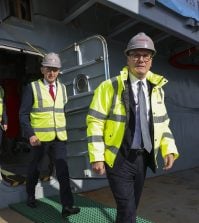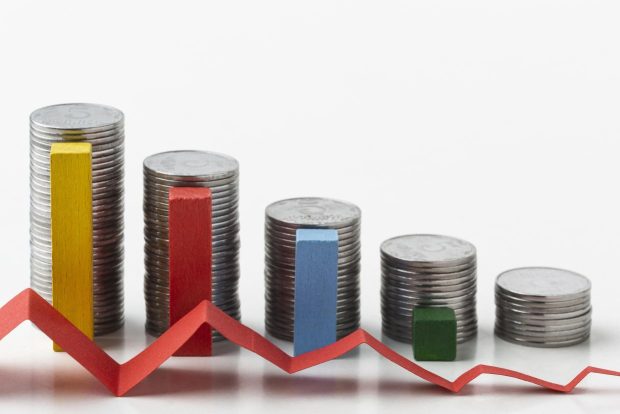Mikhail Pryadilnikov, Analytical Center for the Government of the Russian Federation: Exclusive Interview

Mikhail Pryadilnikov returned to Russia after studying at some of the world’s most prestigious institutions. He tells Global Government Forum why he thinks gaining a global outlook is so important and which sectors are key to diversifying Russia’s resource-dependent economy
Mikhail Pryadilnikov is a great believer in cross-border exchange. He is one of six deputy directors of the Analytical Center for the Government of the Russian Federation, which, much like an in-house think-tank, provides the government with analysis on a wide range of socio-economic development issues including finance, transport, natural resources, environmental protection, education, health, innovation, information technologies, fiscal policy and strategic planning. International exchange is made possible because governments around the world, he says, are “not competing against each other anymore – we can cooperate on best practices.” Even the most advanced economies can learn from each other, he says, because no one has the answers to everything.
This, he adds, is why he attended the Global Government Finance Summit, which brought together 14 countries in April this year in an international gathering of unprecedented scale. The need for increased international dialogues became apparent at the summit, he says, where “the Singaporeans got excited and New Zealanders got excited – both of which are advanced in what they do, and yet they have a lot to learn from each other, and I think no matter where you are, even if you’re top of the field, you still have a lot to learn from others, and the same applies to Russia.”

Pryadilnikov discussing fiscal management with heads of finance departments from around the world at this year’s Global Government Finance Summit in Singapore
International exchange
Pryadilnikov himself travelled around the world a fair bit before becoming a Russian senior civil servant in 2012. After graduating with an MA in government, specialising in public sector management and economic policy, and later a Ph.D in government, from Harvard University in the U.S., he became a research fellow and visiting lecturer in management theory at the London School of Economics in the UK. He also worked for the World Bank as consultant on regulatory reform, public administration and regional development in Europe, Central Asia and the Middle East.
Are there many people working for the Russian government who went to Harvard? “No, I think there’s only one or two,” he says. “It’s very unusual”. While some colleagues find his international background odd, others “appreciate it because I bring something that is a fresh perspective.” Pryadilnikov would like to see more colleagues travel abroad and experience other governments’ approaches. “People can absolutely benefit from more exchanges,” he says, “but I think the next one or two years will be hard because the overall political climate is not very conducive to openness and interaction.”
Since the beginning of the conflict in Ukraine in March 2014, relations with the West have soured, leading the West to impose sanctions on Russia. Some observers have gone so far as describing relations between the West and Russia as a ‘new Cold War’.
In practice, Pryadilnikov explains, the current crisis has little impact on his work: “Nobody’s saying: ‘We’re not using that experience’, or ‘We’re not talking to those guys’. Everybody understands that on a professional level where politics doesn’t play a role, it shouldn’t play a role.”
In fact, the prime minister’s office, which the Center reports to directly, often asks it to find international examples of best practice, and often tight turn-around times of one or two days. However, Pryadilnikov adds, the work pressure in his current job is much more manageable than in his previous role. Before joining the Analytical Center in December 2014, he worked at Russia’s Ministry of Economic Development where he headed up the Department of Strategic Management, Government Programs and Investment Projects.
Long working hours
At the ministry, he says, he worked from 9am until 11pm “pretty much every day”. Such late shifts came about, he explains, because his unit was often in charge of pulling together materials from different ministries for “big strategic documents or ministerial speeches – so we’ll be the last one to receive everything.” And he adds jokingly: “Unfortunately I was the head of that unit so I couldn’t leave the ship early, you know – I was the person in charge.”
The long working hours were part of the reason he decided to leave the civil service and join the Center, where he is still a public sector employee, but not technically a civil servant and “more in charge of my time”.
His increased workload suggests that the civil service is understaffed, compared to the Analytical Center, which is only part-funded by the government and allows for more sociable working hours. “No,” he says quickly. “I think it just says I wasn’t very efficient at organising my department!”

A ‘semi-independent’ Center
Although the organisation gets more than half of its funding from the federal government, it describes itself as providing the administration with ‘independent answers’. How can it maintain its independence if its existence relies on government funds? “We are semi-independent,” Pryadilnikov says. “The idea is that they don’t tell us what to write; they actually appreciate the independent opinion; so that way, if we agree with some policies, we’ll write it, and if we disagree, we may not put it in the public domain, but we’ll still express our opinion.”
While mostly the Center is asked to look into particular areas by the centre of government, “sometimes we also initiate our own projects and say: ‘We think this particular issue deserves more attention.’” On occasion, the centre of government also asks the Analytical Center to assess work carried out by a particular ministry and “provide an alternative view.”
Does this make the Center’s relationship with other ministries slightly awkward? Sometimes they “don’t like what we say,” he replies, but on the whole “they appreciate our external expertise and independent opinion, and it’s a working relationship. We help them to make a product better, and sometimes they come directly to us, not through central government, to asking us directly to contribute on drafting a law or a particular legislation.” The Center employs around 200 people with a broad range of expertise: “A lot of people who work for the Center used to work for different ministries like me, so we know people, and we have economists, regional specialists and social development specialists”, making it a popular point of contact for ministries to ask: “Can you help us, see if we’ve made any mistakes and make it better?,” he says.
The problems with the Ruble
The Center is also tasked with monitoring the development of the Russian economy, which was seriously weakened by the freefalling oil price and western sanctions. “We do weekly reporting on general economic conditions, the level of inflation, unemployment, commodity price fluctuations, as well as other key economic indicators, like foreign exchange and industrial sectors that are maybe facing some issues.”
His Center has been paying close attention to the effects the currency crisis has had on the car industry and found some have actually benefited from the fall in value: Some companies, such as General Motors (GM), have suffered “because a lot of their components come from abroad, so they were importing pretty much everything. But other companies, such as Ford, which buy components from local firms, are actually doing well.” So while GM is withdrawing from the market, Ford is “happy and expanding” and taking up GM’s share of the market.
The Ruble, Pryadilnikov says, “has already stabilised: the Central Bank has been saying maybe it’s too strong now.” However, he adds that “the issue’s not whether it’s strong or weak, the issue is fluctuations. For business in general to make decisions, to think about what to invest in, we need to know how much the Ruble is going to be worth in the long term.”

Pryadilnikov and his international colleagues at this year’s Global Government Finance Summit
Small businesses
Besides the more current problem of stabilizing the Ruble, the biggest fiscal challenge facing Russia is the diversification of its economy, he says. “Russia is very much oil and gas dependent and there’s a drive to rely on other sectors.” The key to diversifying the economy is innovation, he says, and small and medium sized companies (SMEs) are best placed to drive innovation, he says. In Germany, he adds, “80% of the economy is SMEs: they are the ones which at times offer salient solutions. Russia doesn’t have them, SMEs don’t drive innovation here. We want to have not just retail stores and cafés but also small firms which produce products and solutions.”
In order to create friendly conditions for investment in SMEs, the government can do a number of things, Pryadilnikov says: “You can offer tax breaks, you can simplify entry to firms and administration of regulation, which includes not just registration but also getting financing, and you can limit the interference of regulatory abidance.”
To reduce the amount of direct interference with businesses, the Russian government is currently changing its inspection regime from a “blanket” approach to one that is risk-based. “The move is to make sure firms aren’t having any problems; if it’s a small company, it doesn’t present a big risk, then no-one’s going to want to go in unless there’s a problem. But big factories will get inspected more because they pose a bigger risk.” To implement the change, a new law has to come into force, and this is being drawn up at the moment, with the Center’s help. A draft should be ready in July, Pryadilnikov says.
To encourage greater SME activity, the government has also changed its own procurement law: it says that “state-owned corporations must contract out at least 18% to SMEs between 2015 and 2016, and 25% from 2017.”

l-r: Sir Nicholas Macpherson, permanent secretary of the UK Treasury, Ian Ball, chairman of CIPFA International (back), Pryadilnikov and Taşkın Temiz, Turkey’s director general for public finance
Boosting competition
Another measure the Russian government is taking to diversify its economy is reducing its own companies’ domination in certain sectors to boost competition: “Reducing domination of state companies in certain sectors and introducing competition will lower prices eventually, improve quality and make products more competitive.”
Is it not hard to get the state on board with a plan to reduce its own companies’ statuses? “It’s not in the interest of certain heads of companies, but it’s in the general state’s interest to encourage competition.” He adds that the state property agency is currently running a privatisation programme aiming for the government to “keep its stake in only certain strategic sectors.”
Another area Russia’s economy can capitalize on increasingly in the future is agriculture, Pryadilnikov says. Russia – the biggest country in the world – “has a lot of water and a lot of land: you can grow everything here. You can rear cattle, you can grow wheat – there is a lot of potential. But for a very long time the agricultural sector was one of the most inefficient.”
While the sector has already been growing, more can be done, Pryadilnikov argues: “It’s about access to land in general, we need to improve the infrastructure, so the state should be building roads or storage facilities for small farmers. Farmers just want to produce, they don’t want to take care of other things, and the state can help with that.”
Better public administration
It all boils down to improving public administration, he says, which will “make businesses comfortable, so they invest and help create good jobs. That’s why I’ve attended the Global Government Finance Summit and have worked on civil service reform and other issues, you just need to make democratic governance better.”
Pryadilnikov’s motivation to improve public governance goes back a long way. In the early 1990s, when he was in his teens, Russia plunged into a deep recession. Pryadilnikov saw how people were getting poorer and inequality widened and thought: “It shouldn’t be this way, everyone should have higher living standards. It just bothered me,” he says. With encouragement from his parents, he went to study abroad. Pryadilnikov says he had always intended to use the knowledge and skills he has obtained abroad to return to his country and contribute to its development. He says: “I felt I had basic responsibilities to bring something back.”





















